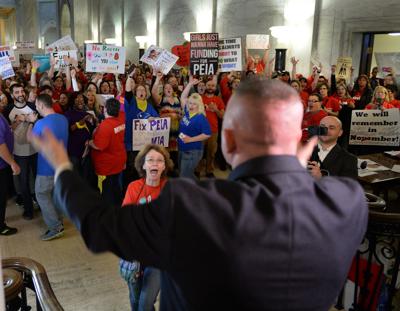The Charleston Gazette-Mail published this editorial on Tuesday.
One of the more interesting Mountain State politicians of the past decade has apparently taken his talents to North Carolina.
Richard Ojeda, a former West Virginia state senator and candidate for multiple offices is now running for Congress as a Democrat in North Carolina����ֱ���s Ninth District in an effort to flip the seat occupied by Republican Rep. Richard Hudson. He filed to run for the seat earlier this month. There����ֱ���s very little official information out there so far, aside from what Ojeda and others from the progressive camp post on social media.
Ojeda only held an elected office in West Virginia for a little more than two years, but his political career has been fascinating, if not downright strange in some instances. The Logan County native has packed quite a bit into such a short window of time.
A 24-year U.S. Army veteran who saw combat in Afghanistan and Iraq, Ojeda first became known throughout Southern West Virginia when he ran against Rep. Nick Rahall, D-W.Va., in the 2014 primary for the Democratic nomination in the state����ֱ���s now defunct 3rd Congressional District. Ojeda lost the primary.
However, he would soon be known statewide.
Ojeda was back on the ballot in 2016, this time seeking a state Senate seat. In the primary, Ojeda faced Democratic incumbent Art Kirkendoll. Ojeda won in an upset, although the race was marred by a horrific incident just two days before the primary.
Ojeda was hospitalized after a brutal beating at the hands of Jonathan Porter at a cookout in Logan County on May 8, 2016. Porter reportedly attacked Ojeda from behind after asking the candidate to attach campaign bumper stickers to Porter����ֱ���s truck. Though Porter described the incident as a fight and not an attack, he to unlawful assault and was sentenced to up to five years in prison. Ojeda would go on to win the seat in the general election.
Ojeda����ֱ���s prominence peaked in 2018, when he was front and center as an advocate for teachers and school service personnel during their statewide strike seeking stability for the state Public Employees Insurance Agency and higher pay. That same year, Ojeda appeared in the Michael Moore documentary ����ֱ���Fahrenheit 11/9����ֱ��� and again ran for Congress in the state����ֱ���s 3rd District, this time getting handily defeated by Republican Carol Miller.
His political career took a few strange turns after that, including resigning from the state Senate and announcing a bid for the presidency just a few days after his loss to Miller. Ojeda pulled the plug on the presidential bid within two months. He also sought to rescind his resignation when he realized then-Gov. Jim Justice planned to replace him with one of Justice����ֱ���s former lobbyists, but that effort was short-lived and abandoned.
In 2020, Ojeda was on the ballot for U.S. Senate, but didn����ֱ���t make it out of the Democratic primary. It was his last bid for public office in West Virginia, though his name stayed in the news. Ojeda sued state Sen. Rupie Phillips, R-Logan, for defamation, claiming Phillips took elements of a Facebook video Ojeda had posted for a campaign ad attacking liberals, even though Ojeda wasn����ֱ���t running against Phillips for the latter����ֱ���s seat. A circuit judge tossed the suit in December 2021, and the West Virginia Supreme Court decided against hearing an appeal in 2023.
Ever since his sudden rise in 2018, Ojeda had been building something of a national presence online, drawing support from progressive media outlets like The Young Turks, which has more than 6 million subscribers on YouTube. Rebel HQ, another online media outlet under the Young Turks network, supported Ojeda����ֱ���s 2018 congressional bid, and Ojeda would later provide commentary pieces for the channel. His for Rebel HQ was posted about two months ago and has more than 900,000 views.
Whether that means anything is hard to tell. The Young Turks is going through something of an identity crisis since Donald Trump won the 2024 presidential election and is seeing its status as a progressive beacon dwindle. But it����ֱ���s hard to determine whether that matters, either. All of this is happening online, and the argument can be made that the average voter in North Carolina, or West Virginia, for that matter, doesn����ֱ���t know about any of this and/or doesn����ֱ���t care.
However, it is interesting that Ojeda is trying his luck in a different state. It����ֱ���s worked very well at some of the highest levels of elected office for Republicans who migrated to West Virginia over the past couple of decades after their political careers elsewhere fizzled out. Whatever happens, North Carolina voters are about to be introduced to a candidate who is anything but boring. It����ֱ���s up to them to decide if that����ֱ���s good or bad.
















